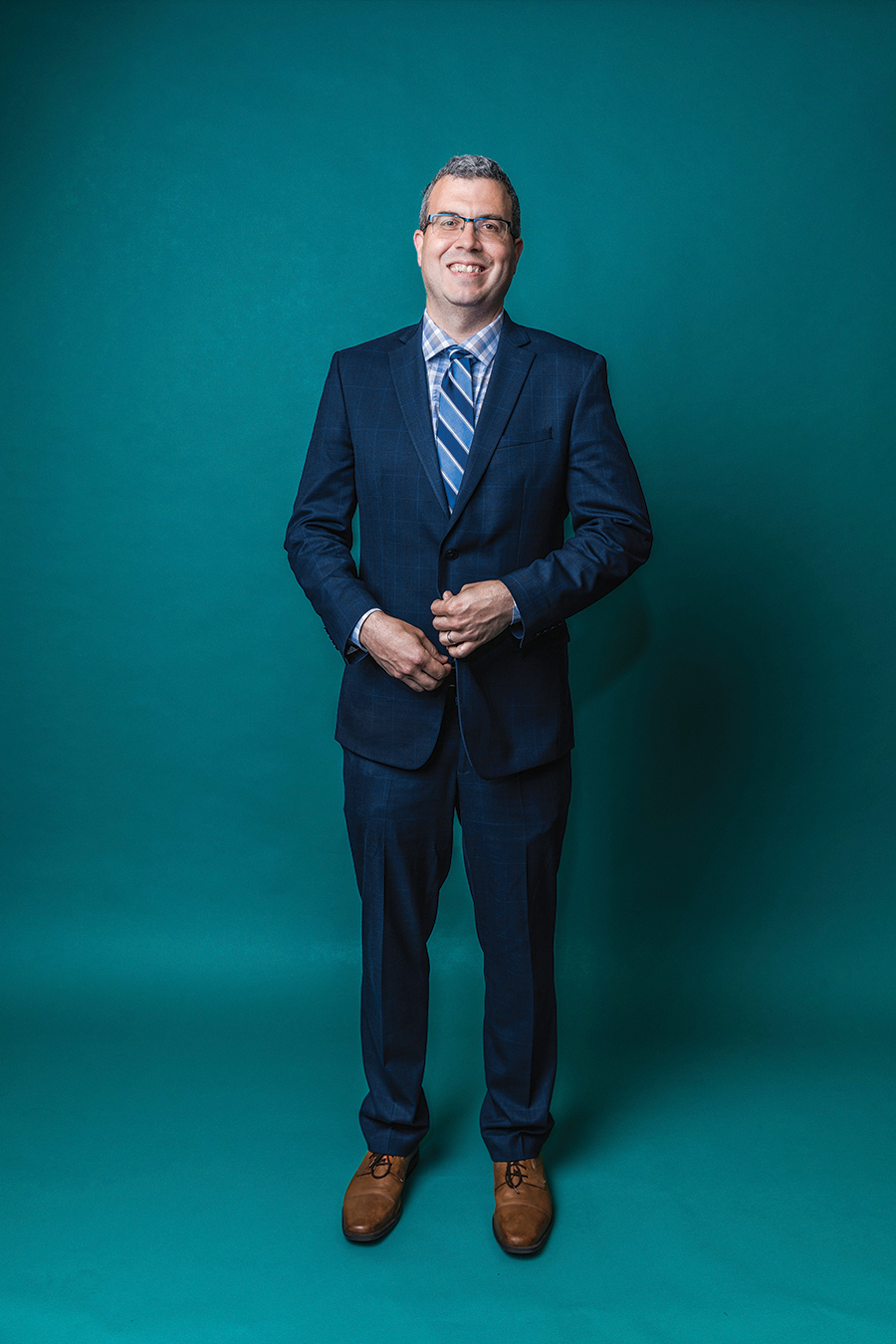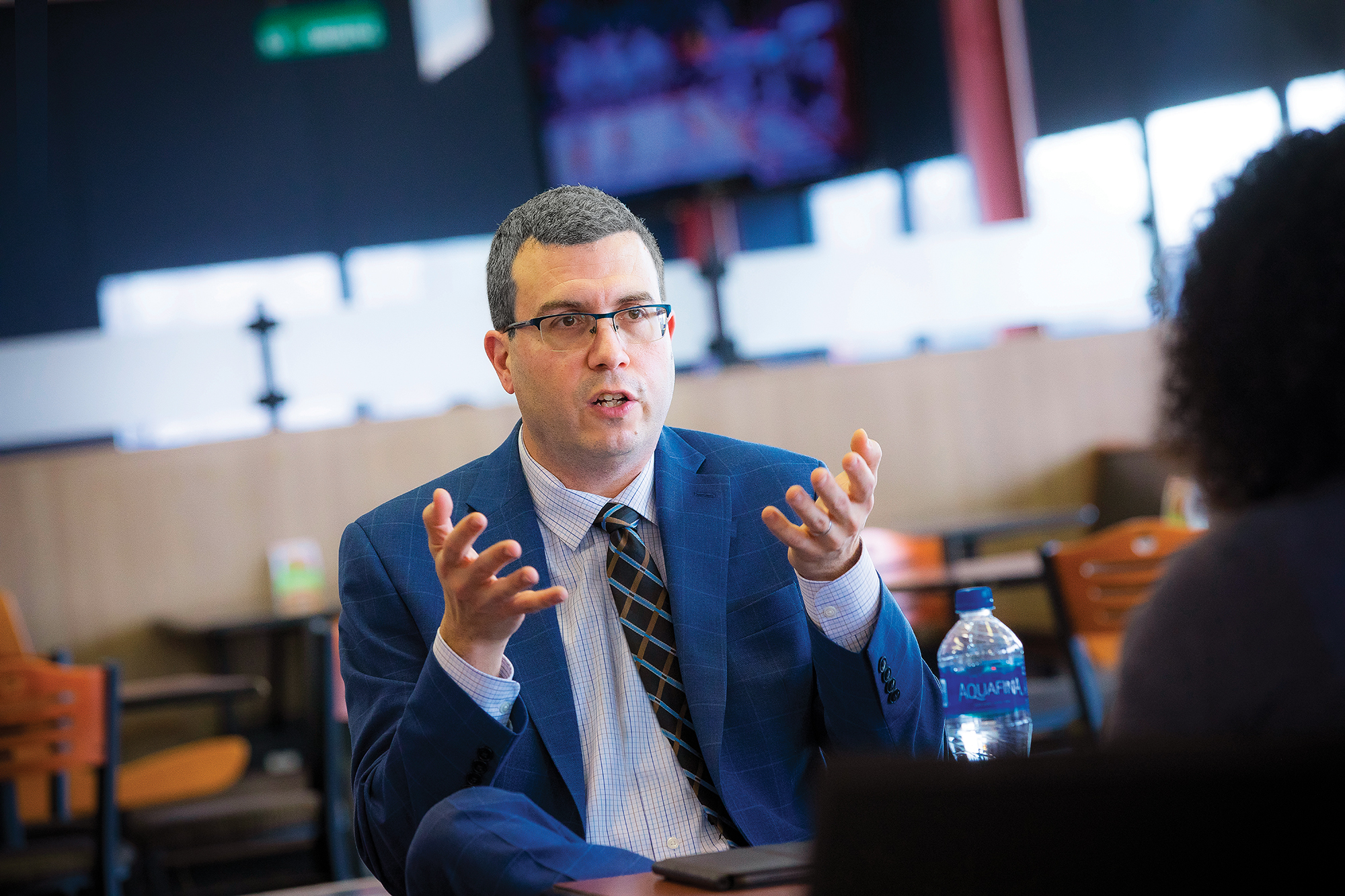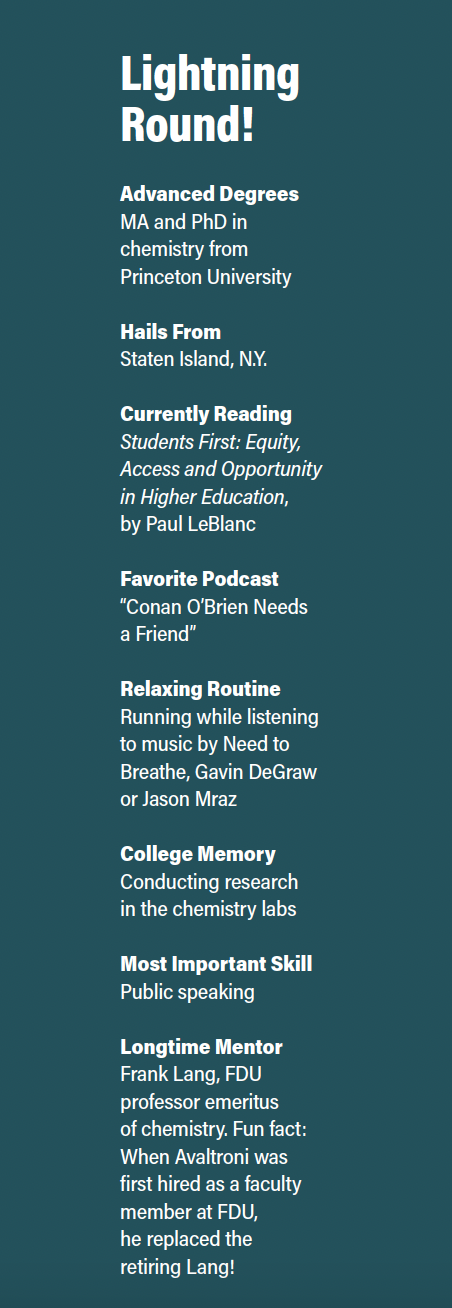Up Close with University Provost Michael Avaltroni

(Photo: Bill Cardoni)
By Kenna Caprio
As a child, Michael Avaltroni, BS’99 (Flor), told people he wanted to be a pharmacist when he grew up. He became a chemist instead, nurturing a lifelong love of the lab, and a professor, teaching at his alma mater, FDU. Then about a decade ago, a new opportunity materialized and Avaltroni worked alongside a handful of colleagues to found the second pharmacy school in the state of New Jersey. He was named dean. Now, after a decade of working in the world he envisioned for himself as a child, he’s thinking even bigger — in January 2022, he was named University provost and senior vice president for academic affairs.
“I see college as being less of a four-year journey and more of a lifetime commitment. We are building immersive relationships with students that don’t just start the day they get here and stop the day they leave,” says Avaltroni. “There’s value in what the students are learning, and they take that into the world, becoming better thinkers, better citizens and better decision-makers.”
Decades of expertise, experience and empathy are informing Avaltroni’s vision, shaping his perspective and strengthening his priorities.
Here he walks us through what’s on his mind.
Generating Dialogues and Partnerships
“I’ve been out talking regularly with our community college partners. We’re looking at ways to create programs that are essentially 2+3 models — two years at a community college and then three years toward a bachelor’s or master’s degree here at FDU,” says Avaltroni.
“We also need to build pipelines from high schools, through our Hispanic Center programs, and create flexibility for students who want to study year-round or attend part-time.”
Avaltroni also wants to invest in immersive living-and-learning communities on campus that “engage students in curricular, cocurricular and extracurricular activities that are deliberate.”
He spearheads the academic vision/academic programs working group for the University’s new strategic plan and the academic affairs subcommittee for the Diversity, Equity, Inclusion and Accessibility (DEIA) Advisory Council.
“Diversity has to be a focus in our hiring processes and in our retention processes. But we need strategies that go beyond hiring, because that can only happen when positions become available,” says Avaltroni. “A good step is to view curriculum through a wider lens — for instance — with health care majors, let’s talk about health disparities and then look at how those disparities translate into other barriers around education and business. This way we embrace the dialogue of diversity so that it becomes part of the culture itself at the University. It’s critically important to establish a culture of diversity, not just an initiative around diversity.”

In the spring, Michael Avaltroni, University provost and senior vice president for academic affairs, launched “Provost Pop-Ups” as a quick and direct way to reach out to the FDU community. Faculty, staff and students were invited to join him for casual conversation. (Photo: Roy Groething)
Embracing a People-first Culture
“We need to build a caring, committed, dynamic and diverse learning community that really embraces the differences among the four campuses; embraces everybody’s abilities; addresses belonging; and understands the social, emotional and behavioral learning needs of our students. And that comes from creating a people-first culture at the University. We need to focus on developing faculty and staff; providing professional growth opportunities; and investing in what I call a teacher-scholar model,” Avaltroni says.
He plans to launch a new teaching institute this fall for faculty to address online teaching; diverse learning and learners; understanding student needs and their social and emotional challenges; and teaching honors students and students with developmental needs.
In spring 2022, Avaltroni introduced the Transformational Excellence Awards to formally recognize the achievements of faculty and staff who regularly “go above and beyond to provide a transformational experience for our students.”
Prioritizing Purposeful Academic Journeys
“To build purposeful academic journeys, we must consider the entirety of the experience — cocurricular, extracurricular, service learning, internships, mentored research, co-ops and academics; because a college education is not only found in the classroom,” he says.
To that end, Avaltroni would like to break long-standing silos and take a more interdisciplinary academic approach, creating dialogues among disciplines.
“The reality is that if you’re a scientist, you might need to understand health disciplines, business, economics and other fundamentals. You can’t operate in a vacuum.”

New degrees might be joint ventures, shared across multiple schools. As an example, a master’s in health administration could be managed and facilitated by the School of Public and Global Affairs, Silberman College of Business and the School of Pharmacy and Health Sciences.
“We have an obligation to take learners from all different backgrounds, meet them where they are and lift them up by really engaging with them in a very interactive and very personal way. We take students with great potential and bring them to a place where they’re tremendously successful, socially mobile and are out there changing the world,” says Avaltroni.
In many cases, he continues, the University already does this — the personalized approach is transformative. “We just need to do the things we do well consistently to create excellence.”
Championing Communication and Care
“We need to rebuild community. The pandemic acted radically upon a challenge we were facing anyway: frustration. People are struggling,” Avaltroni says.
The way to build (and rebuild) enthusiasm and camaraderie, he says, is to foster communication, through honesty and openness about challenges and successes. “So much of the role of a leader is communication. Relationship building. Listening, learning and engaging in a way that allows people to buy into your vision. You have to relate to people that you care, that you want to see things get better and that you want to understand their points-of-view. We need to be collaborators, not employees. I want people to feel vibrant and helpful.”
Avaltroni is also looking to his professorial past for cues on moving forward.
“What I’m proudest of, over the course of my career, are the relationships that I’ve built with students.” He modeled much of his classroom rapport on his favorite undergrad faculty. “The professors I gravitated to were the best teachers. Not the ones necessarily teaching the most interesting subject matter! But these were people who could command a classroom, get students to listen and engage. They were dynamic and influential communicators.”
And now that’s his goal at a much higher level — to have a dynamic and influential tenure, bolstered by clear communication and a strong sense of caring — that keeps the University on track to continue transforming lives.